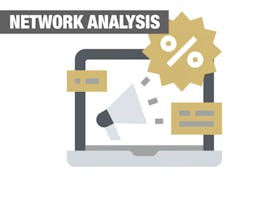Welcome! Throughout this course, Network Systems Foundations, you will delve into the fundamental layers of network communication. You will start with a thorough discussion of the Link Layer and its crucial role, moving on to the intricacies of Internet Protocol (IP) and router data planes, and then navigate through the complexities of the transport layer, application layer, and network security. With a practical focus, you'll write Python code to manage routing tables, analyze network traffic, simulate router functionalities, and create digital certificates for web servers. By the end of this course, you will have a well-rounded understanding of networking principles, from data transmission and routing to application protocols and security, and will be equipped with practical skills to navigate the ever-evolving landscape of network technology.


Network Systems Foundations
Taught in English
Recommended experience
What you'll learn
Describe networking layers in depth and how they relate to one another.
Analyze traffic through python programming.
Design a simplified routing protocol that has similar features as to what powers the Internet.
Develop a client and server with socket programming.
Details to know

Add to your LinkedIn profile
November 2023
5 quizzes
See how employees at top companies are mastering in-demand skills


Earn a career certificate
Add this credential to your LinkedIn profile, resume, or CV
Share it on social media and in your performance review

There are 5 modules in this course
Welcome to Network Systems Foundations, over the next five weeks you'll explore topics related to network systems. This will center on the layered design of networks, and cover the link layer (Ethernet), network layer (IP), transport layer (TCP, UDP), and application layer (HTTP, gRPC). With those as a foundation, you will learn about network security problems and how current solutions work at different layers. We'll start the course by understanding the Link Layer, comprehending its critical role, and exploring why it's vital in the realm of network communication. You'll explore the intriguing behavior of network switches, investigating how they react when receiving frames with various destination MAC addresses. You'll learn to distinguish between the characteristics of different channel partitioning methods, offering valuable insights into network efficiency. You'll explore the Ethernet Frame Check Sequence (FCS) field, uncovering its role and significance in data integrity. Finally, you'll have the opportunity to put your knowledge to the test by designing and developing Python code that can skillfully manage route announcements and withdrawals, ensuring the efficient maintenance of a routing table.
What's included
7 videos3 readings1 quiz1 programming assignment
This week, you will explore the network layer, which is responsible for routing packets between different networks and deals with logical addressing, routing, and forwarding. Throughout the week, you'll learn about the intricacies of the Internet Protocol (IP) and its pivotal role in orchestrating the efficient routing of data. Then, you will explore the intricate operations of router data planes and the concept of routing, focusing on the distinctions between Routing Link State Protocol and Routing Path Vector Protocol. You will then turn your attention to troubleshooting techniques for resolving network layer issues. At the end of the week, you will be tasked with the development of a Python program that simulates the functionalities of a simplified router akin to those employed in the Border Gateway Protocol (BGP).
What's included
9 videos1 reading1 quiz1 programming assignment
This week, you will explore the transport layer, which ensures end-to-end communication, error detection, and data flow control, and protocols like TCP (Transmission Control Protocol) and UDP (User Datagram Protocol) work at this layer. You'll begin the week with an overview of the transport layer and its relationship with the other layers. Then, you learn about multiplexing and how to efficiently combine multiple data streams into a single channel. Then the TCP protocol will be explored, beginning with the establishment of connections and extending to the nuances of congestion control. The concludes with a programming assignment in Python, where you will analyze a pcap file containing a single TCP flow to determine the maximum bytes in flight—a hands-on exploration of the week's concepts.
What's included
7 videos1 reading1 quiz1 programming assignment
This week, you will explore the application layer, where application-specific protocols and services reside. It includes protocols for services like email (e.g., SMTP), web browsing (e.g., HTTP), and file transfer (e.g., FTP). You'll begin the week with an overview of the application layer and its relationship with the other layers. Then, you'll explore the Domain Name System (DNS), unraveling its role in translating domain names to IP addresses. A vital aspect of network application development, socket programming, will be discussed, equipping you with the knowledge to facilitate network communication. The week further delves into application protocols, specifically HTTP and gRPC, detailing their structures and functions. This week, you'll have two programming assignments: one to explore gRPC, and the other, a graded assignment, to create a client-server using socket programming for RPC functionality.
What's included
6 videos1 reading1 quiz2 programming assignments
In this final week, you will delve into network security. The week begins with the basics of network security, then focuses on the intricacies of IPsec, securing the network data plane, and the role of RPKI in fortifying the network control plane. You will examine the bedrock of secure communication—TLS/HTTPS, which extends its protective embrace to the transport and application layers. The week will end with a programming assignment where you will create a digital certificate for a web server.
What's included
6 videos1 reading1 quiz1 programming assignment
Instructor

Offered by
Recommended if you're interested in Computer Security and Networks

University of Colorado Boulder

Coursera Project Network

Coursera Project Network

University of Colorado Boulder
Get a head start on your degree
This course is part of the following degree programs offered by University of Colorado Boulder. If you are admitted and enroll, your coursework can count toward your degree learning and your progress can transfer with you.
Why people choose Coursera for their career




New to Computer Security and Networks? Start here.

Open new doors with Coursera Plus
Unlimited access to 7,000+ world-class courses, hands-on projects, and job-ready certificate programs - all included in your subscription
Advance your career with an online degree
Earn a degree from world-class universities - 100% online
Join over 3,400 global companies that choose Coursera for Business
Upskill your employees to excel in the digital economy
Frequently asked questions
Access to lectures and assignments depends on your type of enrollment. If you take a course in audit mode, you will be able to see most course materials for free. To access graded assignments and to earn a Certificate, you will need to purchase the Certificate experience, during or after your audit. If you don't see the audit option:
The course may not offer an audit option. You can try a Free Trial instead, or apply for Financial Aid.
The course may offer 'Full Course, No Certificate' instead. This option lets you see all course materials, submit required assessments, and get a final grade. This also means that you will not be able to purchase a Certificate experience.
When you purchase a Certificate you get access to all course materials, including graded assignments. Upon completing the course, your electronic Certificate will be added to your Accomplishments page - from there, you can print your Certificate or add it to your LinkedIn profile. If you only want to read and view the course content, you can audit the course for free.
You will be eligible for a full refund until two weeks after your payment date, or (for courses that have just launched) until two weeks after the first session of the course begins, whichever is later. You cannot receive a refund once you’ve earned a Course Certificate, even if you complete the course within the two-week refund period. See our full refund policy.


